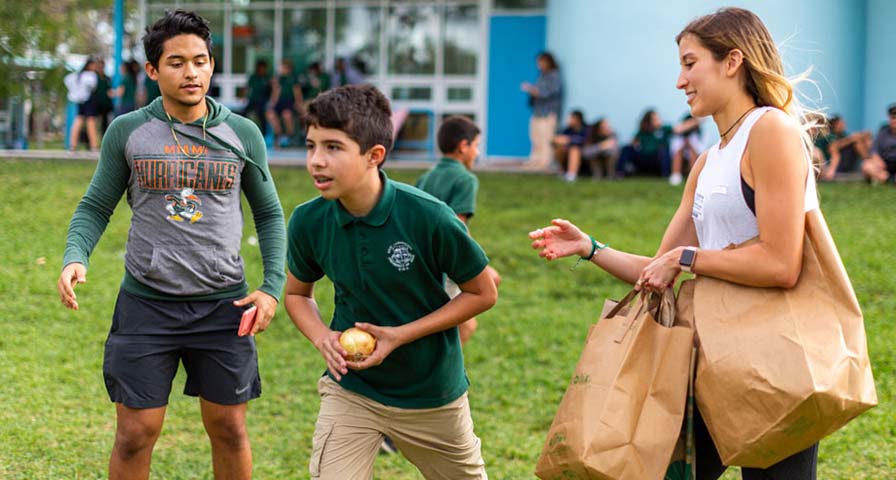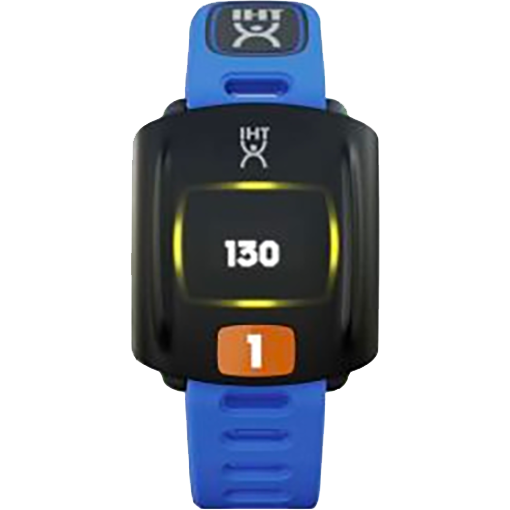Originally published Feb. 28, 2019 by the University of Miami.
By Barbara Gutierrez
The exercise was simple enough. University of Miami professor Arlette Perry asked a roomful of seventh graders: “How much sugar is in a McDonald’s smoothie?”
With the help of Isabella Rios, a 13-year-old student, she measured a whopping 16 teaspoons into a clear glass full of water.
“That is gross,” said Rios, as her classmates giggled around her. Learning the perils of too much sugar in their bodies is only one of many lessons for this class of 7th graders at Henry S. West Laboratory School (West Lab). They are participating in a Translational Health in Nutrition and Kinesiology (THINK) program, sponsored by the University of Miami’s School of Education and Human Development.
 The program — which had only been offered at several schools throughout the county as an after-school or summer program since 2012 — is now fully integrated into the West Lab curriculum. The program aims to teach children all about nutrition and exercise while drilling concepts that will enhance their knowledge of the STEM fields.
The program — which had only been offered at several schools throughout the county as an after-school or summer program since 2012 — is now fully integrated into the West Lab curriculum. The program aims to teach children all about nutrition and exercise while drilling concepts that will enhance their knowledge of the STEM fields.
“This is the first time we have a school accept the program into their regular curriculum,” said a proud Perry, UM professor in the Kinesiology and Sports Sciences Department. “The goal is to empower students to improve their own personal lifestyle behaviors and serve as health ambassadors for their families and their communities.”
For Maya Collie, 13, learning through the THINK program how certain exercises could enhance certain body muscles came as a revelation. She began doing lunges to strengthen her thighs and legs.
“So the first time I did a vertical jump I was only able to reach three-quarters of the height on the wall,” she said. “After the exercises, I was able to clear the wall.”
Reinforcing lectures with hands-on clinical experiences and physical activities enable students to learn how good nutrition and exercise can improve the way their body functions, said Perry.
The students will also learn how to use exercise physiology equipment, heart rate monitors, and other instruments at UM’s Kinesiology Laboratory, to learn more about their bodies and how the body functions in response to exercise. They will get to measure their maximal force production and examine the electrical activity of the heart.
Others will undergo a graded exercise test to maximum on a metabolic cart and gauge their aerobic fitness, said Perry. “Their eyes light up when they are involved in the laboratory hands-on experience,” said Perry.
For West Lab principal Barbara Soto Pujadas, the THINK program is beneficial since it reinforces concepts in STEM (science, technology, engineering, and math) in all the classes. Students get weekly written assignments that touch upon one or several of the STEM concepts.
“The THINK course is aligned with our school’s instructional philosophy that students learn best in a setting that promotes STEM education,” said Soto Pujadas.
During Monday’s nutrition class the enthusiasm was palpable. UM graduate student Gina Zito showed the students the basics of the Harvard Nutrition Plate, a plate created by nutrition experts to show which foods one should eat to be healthy. Questions were bouncing off the classroom walls: “Is a walnut a protein or a carbohydrate?” “Is freshly squeezed orange juice better than concentrate?” “Is almond milk more nutritious than cow’s milk?”
After the lecture, students ran to the open play yard to participate in a relay race to show their knowledge of the different food groups. Each student received a bag with a food item and then ran as quickly as possible to place the food in the appropriate square on the cardboard duplicate of the Harvard Nutrition Plate.
Michael Valdez ended up with a box of pasta and he ran to place it in the carbohydrate slot. As he ran back smiling, he said: “What I love the best about this program is that we get physical education.”
This summer, Perry will be offering a six-week THINK summer program for free for middle school students in collaboration with the Children’s Trust Foundation who will be funding the program at UM’s Laboratory of Clinical and Applied Physiology.
Seeking IHT Spirit System information?




